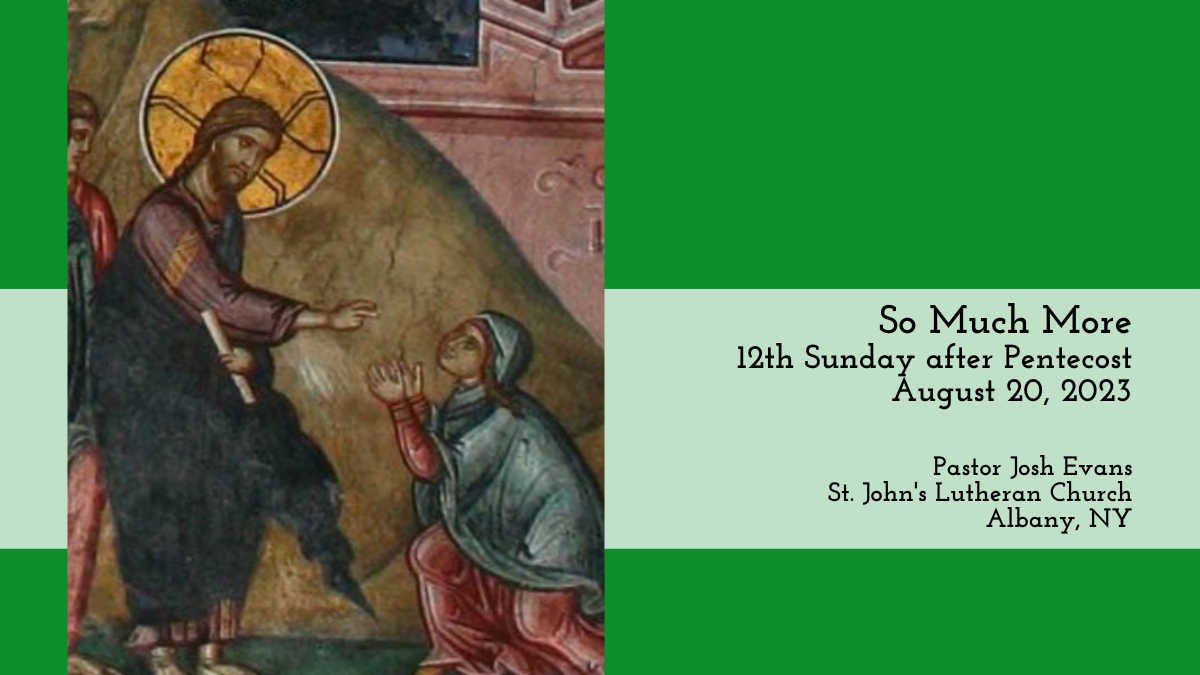St. John’s Lutheran Church
20 August 2023 + Lectionary 20a (12 Pentecost)
Matthew 15.21-28
Rev. Josh Evans
“Divorced. Beheaded. Died.
Divorced. Beheaded. Survived.”1
Such are the respective fates of the six wives of King Henry VIII, as each of them recounts in turn, during a fictionalized pop concert that forms the basis for SIX: The Musical (now playing on Broadway and coming soon to Proctors Theatre!).
The six queens agree to hold a contest: re-telling each of their stories to determine who had the worst experience in their marriage to Henry. As the wildly energetic musical progresses, the queens sing of infidelity, jealousy, resentment, trauma, and abuse – with two marriages ending in divorce, two by beheading, and one by natural death…
Until the final queen, Catherine Parr, the sole “survivor” who saw Henry to the end of his life, takes the stage and starts to question the point of a contest that defines each of them only by their connection to their common spouse.
After telling her story, Catherine asks, “Why should that story be the one I have to sing about just to win? That’s not my story. There’s so much more…”
But as it is, she mournfully concludes, Catherine and her fellow queens are trapped in a story that defines them by a single role. “Without him, I disappear. We all disappear.”
***
The Bible has its own unique way of trapping its characters – and particularly its women – in stories that define them by a single role. And outside of those roles, some characters effectively disappear – their individuality and their humanity lost.
The story of the Canaanite woman’s request is arguably one of the hardest stories to grapple with in the gospels. Jesus, meek and mild, savior of the lost, friend of tax collectors and sinners, who reaches out to the marginalized and oppressed … calls a woman a dog?! What are we supposed to do with that?
And like too many others in the pages of scripture, this woman doesn’t even get a name. Talk about getting lost in the story.
She did have a name, to be sure, and she has her own story.
But all we know about her for sure is that she has a daughter. Which presumably means she has (or had) a significant other. And importantly, she’s also a Canaanite. A foreigner and an outsider, at least as far as Jesus and his disciples are concerned. Without a name, this woman is defined only by her status compared to the others in the story.
Her initial shouting plea is outright ignored. Jesus doesn’t answer her at all, and the disciples, instead of acknowledging her with a response directly to her face, complain to Jesus behind her back: “Send her away!”
But she doesn’t go away so easily. And her pleading only grows more intense: “Lord, help me.”
This time, instead of the silent treatment, Jesus downright insults her: “It’s not fair to take the children’s food and throw it to the dogs.” Wait a minute … What did Jesus just call her?!
Still, even in the face of silence and insults, she won’t take no for an answer. She simply won’t let that be all of her story.
For all his parables about abundance and grace, Jesus seems to have forgotten his own teachings. But, in this moment, this Canaanite woman recognizes something that Jesus doesn’t about the reign of God.
She knows and deeply trusts that God’s reign is even for the dogs that no one gives a damn about. She so trusts this to be true that she risks speaking up and speaking out against a perceived injustice.
And her vulnerability pays off.
“Great is your faith!” Jesus commends her persistence, and her daughter is healed.
So what exactly happened? Did Jesus change his mind? Can Jesus change his mind? Did this woman change Jesus’s mind?
***
By the end of the show, after Catherine’s mournful realization, the queens decide they’re not going to let their relationship to Henry be the only thing that defines them any longer.
“We don’t need your love!” they defiantly proclaim, as they proceed to do a little “histo-rewrite,” and imagine an alternate history that defines them by their individual accomplishments and validates their personhood apart from Henry.
As they sing triumphantly and decisively: “We don’t need your love ‘cause we’re so much more.”
***
The Canaanite woman doesn’t need Jesus’s approval to validate her personhood.
She doesn’t need Jesus’s love. She demands it.
In the face of silence and rejection, she takes matters into her own hands and flips the story on its head.
And in so doing, this woman – not Jesus, not even his disciples – but this unnamed woman takes center stage and reminds them and us:
God’s love is even for the ones you call dogs.
God’s love is for the marginalized, the oppressed, the cast aside, and the forgotten – especially for them.
God’s love cannot and will not be restricted and contained to any one group.
Because God’s love is so much more.



